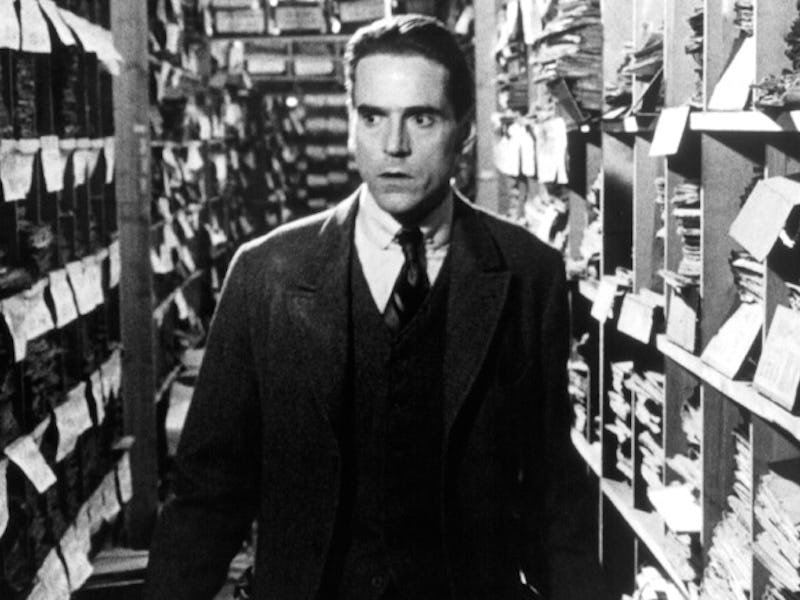The trippiest biopic ever made deserves another shot
“You’ll never reach a man’s soul through a lens."

Kafka falls through the door and turns, a look of pure horror at the scene before him: a vast, cavernous room. Inside, a gigantic monstrosity beyond comprehension. Beneath it, a man, tethered, terrified.
Kafka, confronted with the nightmares he’s written about, now realized in front of him, falls to his knees in despair. “You’ll never reach a man’s soul through a lens,” he says.
Dr. Murnau, dressed in a black business suit and white necktie, his cold, by-the-book expression more menacing than any of the hoods under his employment, stands over Kafka and says, “That rather depends on which end of the microscope you’re on doesn’t it?”
Kafka bombed at the box office but went on to become a hard-to-find cult classic.
Like a cross between Brazil, The Third Man, and The Wizard of Oz, Steven Soderbergh's Kafka blurs reality between fact and fiction in this forgotten 1991 biopic/noir thriller, which takes the life of Franz Kafka and infuses it with the writer's uniquely bizarre narrative style.
Set in post-WWI Prague, the movie follows the life of Kafka, an insurance clerk who, after a colleague of his is murdered, becomes involved with a dangerous underground group of activists intent on destroying a sinister organization that controls society.
Kafka, a cog in the system and a disappointment to his father, but who dreams of being a writer, is a perfect hero for our modern age. A free spirit being crushed under the boot of progress.
After a poor box office performance and mixed reviews, Kafka dropped off the radar completely to become a rare cult classic. Soderbergh's promise of a radical recut, including a full redub in German, only adds to the mystique of this shadowy cinematic exploration. For now, the movie is practically impossible to find online, but I managed to watch it via a charitable third party, adding a clandestine thrill to my mind-bending movie night.
Jeremy Irons stars in Kafka.
Talking to Empire magazine in 2013, Soderbergh said that the tone was all over the place, placing the blame on his youthful ambitions. His still unrealized recut has promised to be more abstract, more of a hardcore art movie. Soderbergh's misgivings about this film are his own to express, but the movie we got — still beloved among a cult following — deserves a re-release on its own merits.
Kafka is a radical departure from Soderbergh's first, much-lauded movie, Sex, Lies, and Videotape. Reminiscent of Orson Welles’ The Trial, Kafka is a love letter to the noir cinema of the ‘30s and ‘40s. It’s full of dutch angles and long shadows, populated by ominous figures in dark overcoats. It boasts a stellar cast, including Jeremy Irons in the lead role, along with Ian Holme (Bilbo Baggins in The Lord of the Rings), Armin Mueller-Stahl (notably from David Fincher’s The Game), and even Obi-Wan Kenobi himself — the great Sir Alec Guinness.
A superb score, by ex-Red Hot Chilli Peppers drummer Cliff Martinez, evokes both the Eastern European setting and the music of Anton Karas (composer of the famous Harry Lime theme from The Third Man). Martinez and Soderbergh's fruitful creative relationship stood the test of time, spanning ten movies.
A Dutch Angle in Kafka.
Kafka is a haunting vision of a man both expertly in tune with the horrors of mechanized age and a tragic victim of it. It’s also a dark and twisted thriller with a truly shocking finalé. Despite its somber tone it manages to keep a pitch-black sense of humor too. There’s plenty of references to keep the die-hard Kafka fanatic happy, but even those who know nothing of the author can enjoy this surreal nightmarish yarn.
In managing to marry some true elements from Kafka’s real life with the macabre visions of his books — The Trial and The Castle in particular — Soderbergh reaches an audience that might not otherwise have sought it out. He captures both the man and his work in one film.
Kafka’s dashed ambitions are as much at the heart of the story as his attempts to uncover what clandestine organization is killing members of a militant group of political activists. Deciphering which is fact and which is fiction isn’t important, but it makes you want to do it nonetheless. A better introduction to learning about this celebrated literary figure I cannot imagine.
“You sit around twisting the facts to suit your inbred theories,” Kafka says at one point in the film. “In my experience, the truth is not that convenient”
“In my experience, the truth is not that convenient."
It’s a movie full of paranoia, conspiracy, and domestic terrorism. Its relevance is no less diminished than Kafka’s own writing, now almost 100 years old. Much like the protagonists of his stories, Kafka often felt alienated and frustrated by fruitless attempts to achieve the unachievable. His goals of writing were met with the brick wall of rejection and in some ways, this formed his writing style.
A promised dual release would see this movie placed alongside a German-dubbed younger sibling. Hopefully, one day, we’ll get to compare the two.